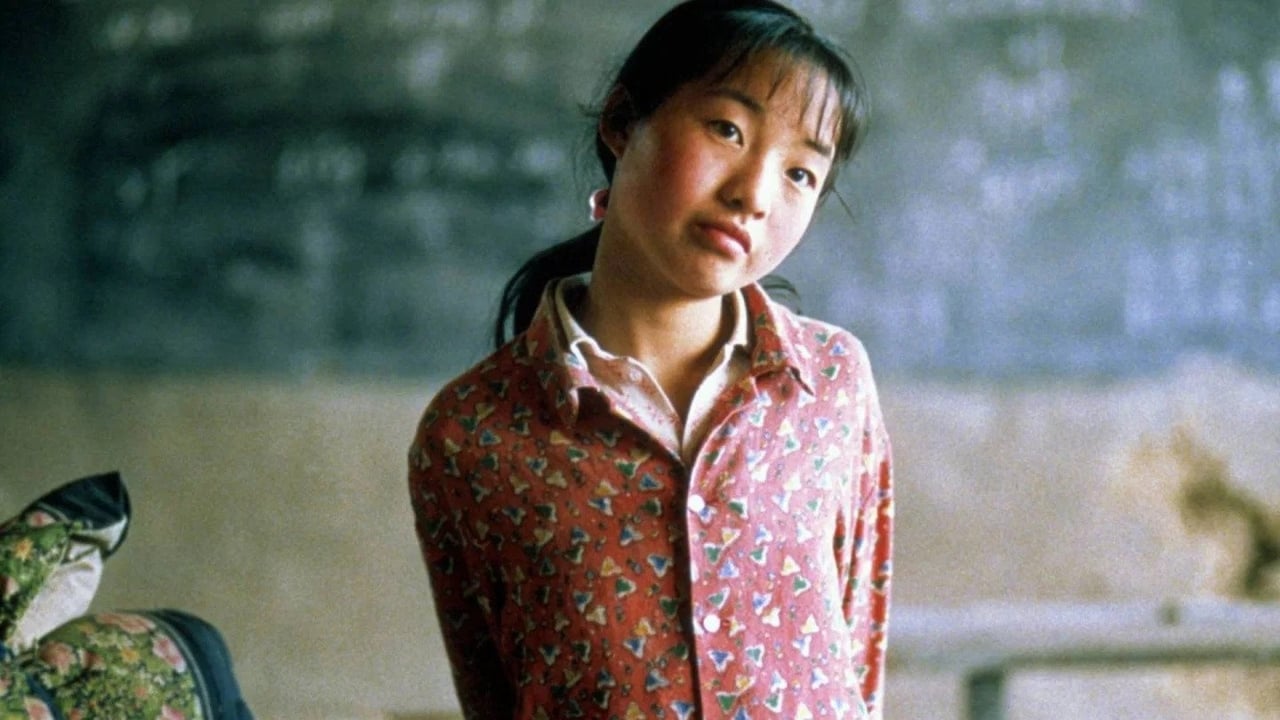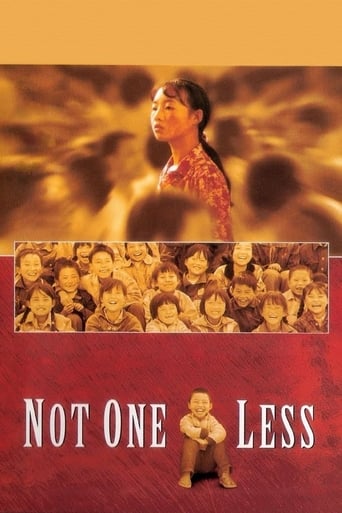

People are voting emotionally.
... View MoreCrappy film
... View MoreIt isn't all that great, actually. Really cheesy and very predicable of how certain scenes are gonna turn play out. However, I guess that's the charm of it all, because I would consider this one of my guilty pleasures.
... View MoreThis is one of the few movies I've ever seen where the whole audience broke into spontaneous, loud applause a third of the way in.
... View MorePLOT SUMMARY At a remote Chinese primary school, a thirteen-year girl, Wei Minzhi, was employed as a substitute teacher for the regular teacher, Gao, who had to leave for a month to look after his ailing mother. For her work she was promised fifty Yuan and Gao agreed to give her a bonus of ten Yuan if she managed to retain all his twenty-eight students, hence the title, Not One Less. As she was barely older than her students and her limited education she encountered difficulty in running the forty-five year-old school. She had to face a particularly disruptive boy, Zhang Huike. One day he failed to turn up to school as he was compelled to look for work in the city to cater for his ailing, debt-ridden mother. Determined as ever, Wei tried to raise the necessary funds with the help of the other students to go to the city and bring him back. To Wei and Zhang city life was alien and harsh as they struggled to feed themselves and sought shelter in the railway station. It was through the local television station's contact that they were finally reunited. Not only was her goal achieved but she managed to get other resources for the students and to rebuild the school, later renamed Shuiquan School of Hope. ANALYSIS Zhang Yimou, the producer of such colourful, mythified, melodramatic movies like "Raise the Red Lantern" and "Red Sorghum" had come full circle to produce this semi-documentary, realistic film. However, given his experience as a rural worker (1968 to 1878) during the Cultural Revolution, it is not too surprising that he had come up with this emphasis on real rural life in contemporary China, the prevailing poverty, children deprived of education and hardships faced by the inhabitants. This "realistic" film is underlined by the use of amateurs instead of professionals. Most played their real-life roles, for example, the mayor is actually Tian Zhenda, the teacher is Gao and two children Wei Minzhi and Zhang Huike played characters of the same name. Settings such as the school, the local television station and the city (Zhangjiakou) are real. The only connection with the Zhang Yimou of old is his preference for red which is depicted by the large red flower in front of the truck carrying the goods to the village. There are four major themes in this film. The first focused on courage and determination. Once Wei made up her mind to go to the city to bring Zhang back nothing could stop her. She was not concerned about her own safety in an alien environment and her limited resources. We first saw her determination when she tried to stop one of the girls from being taken away to the Sports academy. Although she was lost in the city and made to wait for one and a half days to meet the station manager she did not give up. It was her sheer courage and determination that won the day. These two qualities plus persistence and endurance are reminiscence of human qualities that we see in many of Zhang's films.The next theme is the prevailing poverty in the rural areas. We see the decrepit school condition, the broken school furniture and children migrating to the city to work to support the family. The third is the importance of money, including the lack of it. Money permeates this film from beginning to end. Early in the film Wei asked Gao about her pay and later we saw how she tried to raise funds for the bus trips and at the same time the students learned how to count. The lack of money meant Wei and Zhang had to sleep in the railway station and rely on leftovers to fill their stomachs. On the positive side money was donated to rebuild the school and settle Zhang's mother's debts. The final theme is the urban-rural dichotomy. On one hand, we saw beautiful natural landscape relatively untouched by man, on the other we saw the busy, crowded and man-made city landscape with high-rise buildings. This dichotomy is also the rich and poor divide. Coming from the countryside where everybody knows and helps each other, Wei and Zhang were misfits in this new uncompromising environment. Not only were their clothing different, they encountered unfriendly and unhelpful people like the receptionist at the television station. Zhang Yimou raised these themes of rural poverty and rural-urban dichotomy to highlight the prevailing social inequality that exist in China and hopefully generate some support to alleviate poverty. His final message stated that one million children had dropped out of school annually because of poverty. Financial help from various sources had enabled fifteen percent to return to school. This is powerful message that he had sent out in this film.
... View MoreSurprisingly, I never lost my patience or got bored while watching this, even though it is very slow, understated film in which there is a great deal of repetition and very little character development. Zhang Yimou takes us along with a 13-year-old substitute teacher, played, like the other characters, by a nonprofessional actor (the credits even tell you where each person comes from, and that most of them actually do the jobs in real life that we see them doing here).It is fascinating to see the bonds develop between the teacher and her students almost without anyone trying. The film barely even seems like it needs a "quest," but when one develops, the teacher's plight is even more poignant. I will say that I'm not sure I got any great insights into the problem of "poverty in rural China," but the mindset of the characters as Zhang shows them obstinate and determined was quite captivating.
... View MoreA true story, or not? It doesn't matter. This is such a brilliant movie on so many levels its hard to recount them all.This is a great movie for just about anybody. It gets better if you like a story that features an un-compromising, absolutely determined female child in the lead role. But its even better if you happen to have had a teacher in your life you endeared, or are a teacher and have had a favorite pupil. It gets better if you're a father looking for a strong role model for your daughter. Its better still if you have Chinese ancestry in your family. It gets better if you have an interest in learning more about the daily conditions of modern-day rural and urban China, delivered via a master cinematographer. It gets better if you think education occurs best when children take an active role in lessons situated in a context meaningful to them (see the math lessons in the movie). And finally, if you are many of these, there's a message at the top of the credit roll that will either break your heart or confirm your knowledge of the relentless unfairness of the human condition.On top of all this, the movie is littered with priceless vignettes: the children writing single-character calligraphy on the chalk board; the misbehaving students and the absent teacher; the dedicated teacher who will stand for two days at the security gate asking every passerby if they are the "general manager"; the famished child waif guiltily but aggressively eating someone's leftover dinner from the tabletop of a street-side café; the pervasive role of money on life's most basic pursuits.This movie has the emotion of "To Sir, with Love" and the honesty of Himalaya.Yimou Zhang doesn't just use actresses and actors to portray the parts; he uses the real thing, culling the mayor, students, and teachers from rural villages, the television station manager, the restaurateur from the city, etc. How he manages to capture these people in the natural presentations of their characters is impressive. The performances were so convincing I marveled at their exquisite, authentic qualities. I kept asking myself "how did these actresses and actors nail their parts so well?" When the credits rolled the secret was revealed.
... View MoreAn excellent movie. Hats off to the director Yimou Zhang for getting wonderful performances from non professional actors. The way a burning social problem, effects of poverty on the education system and poor children, is interestingly woven into a story and captivating plot structure. The substitute village teacher, Minzhi Wei, a 13 years old girl, wants to buy a round trip to the city by bus from her workplace to fetch a missing student and does not have money. She succeeds in convincing the whole class to do labour,carrying bricks, to mobilize money. The ensuing mathematical calculations in the class and on the black board add to the school goings on while touching the emotional chords of the audience. The teacher's struggle in the city to trace out the student, her stubborn 'never say quit' attitude form part of the later half of the film that ends on a positive note by bringing the problem of education into focus. The contrast in the village and urban life styles is well brought out. some scenes that impressed me strongly are: the teacher running after the van carrying a student. argument by the teacher and students with the brick kiln owner. teacher's walk to the city. the writing of posters by the teacher and the posters being swept away while the teacher is asleep. the innocent enquiries of the teacher at the TV Station entrance. the broadcast talk of the teacher addressed to the student. the joy of the students when they get lots of colorful chalk.a must watch for all the socially aware citizens of the world.
... View More